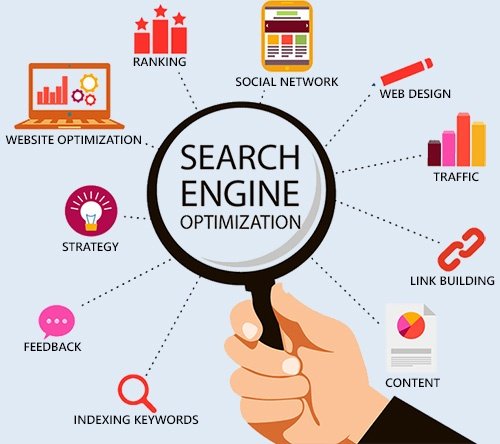SEO stands for Search Engine Optimization. It’s the process of optimizing a website or online content to improve its visibility and ranking on search engines like Google, Bing, or Yahoo. The goal of SEO is to drive more organic (non-paid) traffic to a site by making it more likely to appear in search results when users look for relevant topics, products, or services.

Brief History-
SEO has evolved a lot since it started in the late 1990s. Initially, it was all about basic tactics like using keywords excessively and having lots of backlinks. Over time, search engines, especially Google, have become much more sophisticated, making SEO more complex and focused on user experience.
Here’s a quick breakdown of how SEO evolved:
- The Early Days (1990s-2000s):
- Websites could rank by simply stuffing their content with keywords and getting as many backlinks as possible.
- Search engines weren’t as advanced, so ranking was easier if you had the right keywords and a lot of links.
- The Rise of Google (2000s):
- Google introduced algorithms like PageRank, which focused on the quality of backlinks (not just quantity).
- SEO started becoming more about relevant content and building authority, not just keywords and links.
- The Panda and Penguin Updates (2011-2012):
- Google rolled out major updates (Panda in 2011 and Penguin in 2012) to crack down on spammy tactics like keyword stuffing and low-quality backlinks.
- SEO shifted to focus on high-quality, original content and ethical link-building strategies.
- Mobile and User Experience (2010s):
- Google made mobile-friendliness a ranking factor as mobile searches increased.
- SEO began focusing more on user experience, including fast-loading pages, easy navigation, and mobile optimization.
- The Rise of AI and Semantic Search (2020s):
- With updates like BERT (2019) and MUM (2021), Google started to understand language and search intent more deeply, moving away from exact keyword matches to more context-based results.
- SEO now includes optimizing for voice search, user intent, and providing valuable, helpful content that answers real questions.
- AI tools, like chatbots and automated content creation, are also impacting SEO strategies.
In short, SEO has gone from keyword-stuffing and backlinks to focusing on creating high-quality, user-focused content and improving website performance across all devices. Now, it’s not just about what you say, but how you say it, and how well you meet users’ needs.
SEO involves various strategies, including:
- Keyword Research: Identifying the terms and phrases that people are searching for.
- Example: – “New York bakery” or “best cupcakes NYC.”
- On-page SEO: Optimizing elements on your website like titles, meta descriptions, headers, and content.
- Off-page SEO: Building backlinks and improving the site’s reputation across the web.
- Technical SEO: Improving the technical aspects of the website, such as page load speed, mobile responsiveness, and URL structure.
Overall, SEO aims to make websites more search-engine-friendly and relevant to users’ queries, which can lead to more visitors and ultimately more conversions (sales, sign-ups, etc.).
SEO Importance:-
SEO is crucial because it directly impacts your website’s visibility, traffic, and overall success. Here’s why it’s so important:
- Increased Organic Traffic: When your site ranks higher in search results, it gets more visibility, leading to more organic (non-paid) traffic. More traffic = more potential customers.
- Builds Credibility and Trust: Websites that rank highly are often seen as more credible and trustworthy by users. If your site is listed at the top of search results, users are more likely to trust it as a reliable source.
- Better User Experience: SEO isn’t just about rankings. It includes optimizing your site’s speed, mobile responsiveness, and navigation. This leads to a better overall user experience, which encourages visitors to stay longer and engage with your content.
- Cost-Effective: Compared to paid advertising (like Google Ads), SEO is more cost-effective in the long run. While SEO takes time to show results, once your website is ranking well, you get a steady stream of organic traffic without continuously paying for ads.
- Competitive Advantage: SEO helps you stand out from your competitors. If you’re optimizing your website and your competitors aren’t, you can gain an edge in search rankings, attracting more customers.
- Long-Term Growth: SEO builds long-term visibility. While paid ads give you a temporary boost, the benefits of SEO can last months or even years if done right, leading to sustainable growth.
In summary, SEO is essential for driving organic traffic, enhancing your website’s credibility, providing a better user experience, and staying competitive in the digital space. It’s a fundamental part of any digital marketing strategy.
